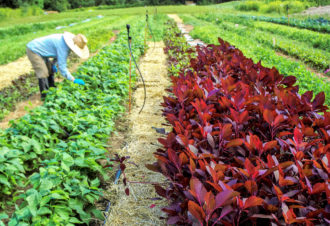The New Entry Sustainable Farming Project (NESFP), led by Jennifer Hashley, has a 20-year history of training next generation farmers—including immigrant and refugee growers—to improve local food systems. A recent Northeast SARE Partnership grant supported the Project’s food hub initiative aimed at long-term economic self-reliance among farmers while expanding access of healthy, culturally-appropriate foods in underserved areas.
The grant funded exploration of institutional market connections for ethnic produce grown by immigrant and refugee farmers who struggle with market access and low pricing of products. The team sought to establish institutional accounts with large retailers, local universities and workplace dining service companies, local restaurants, and non-profit organizations focused on elder care and low-income families. The project also provided technical assistance to 20 farmer clients to refine production schedules, crop plans, food safety plans and other considerations to meet institutional buyer demands.
As a result of their work, seven farmers increased their readiness to work with wholesale accounts and they established or strengthened partnerships with 12 institutional buyers. The team confirmed that institutional markets range in their interest in ethnic produce, volume demands, price-points and flexibility. Selling to non-profits focused on elder care and low-income families fit best with NESFP’s food hub although the project team concluded that institutional markets may not be the best avenue for mission-oriented programs like theirs that focus on new farm business development.
